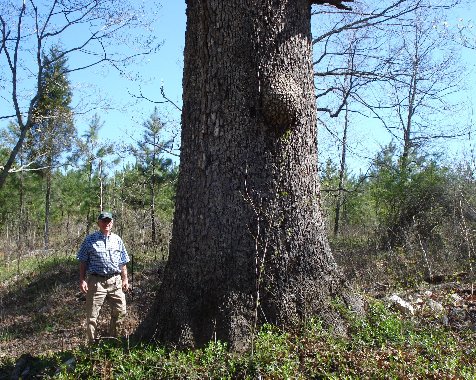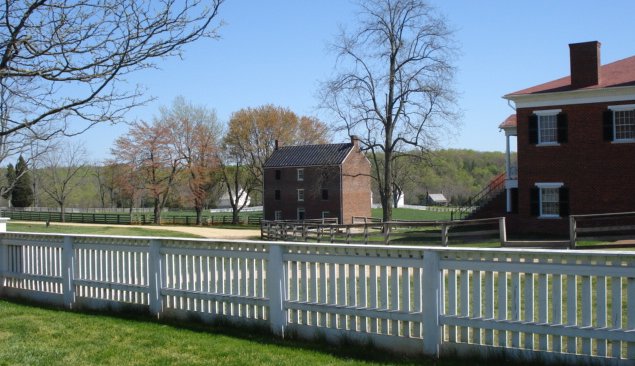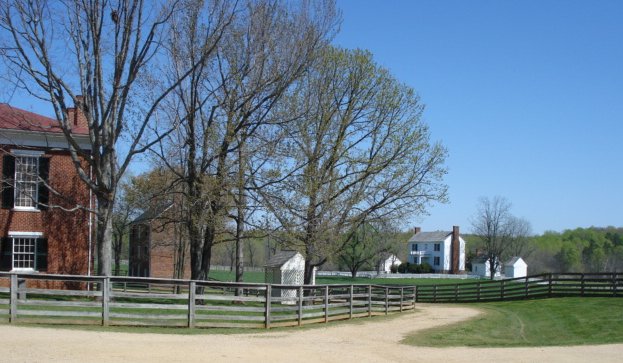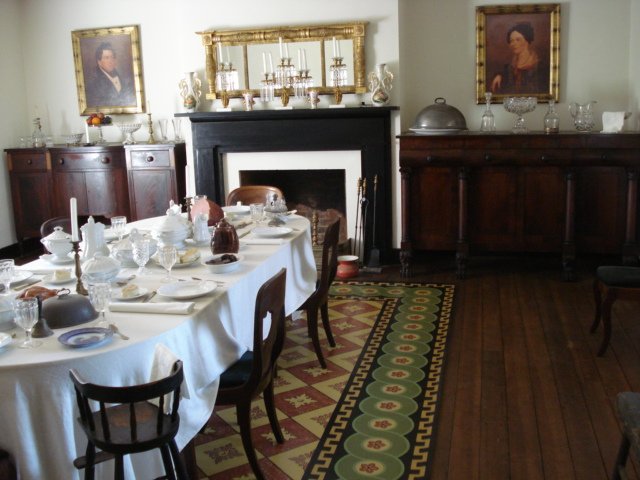Below is Tom Newbill, this year’s tree farmer of the year, next to his biggest oak tree. It stands in one of the five family graveyards on his land. In the old days, people buried their relatives on the old farmstead. Tom says that some people still visit the graves, but less frequently as time goes on. Sic transit gloria mundi.

The most poignant is a grave of a nine year old girl called Goldie, who died just before Christmas in 1914. Her grave is alone, near where the farmhouse stood, but away from other family members. I am sure there is a story, but nobody will ever know.
This year’s tree farmer of the year lives in Hardy, near Roanoke, a little more than a four hour drive from Vienna. Since I had to get there at 9am, I set out early in the morning. I took 66 to 81 and made good time and was almost to Lexington by the time the sun came up. It is tough driving on 81. 81 is the truck route that serves the East Coast and it is uncomfortable to be the little guy among the giant trucks.
The Shenandoah Valley is beautiful at dawn or at any other time. Looking at it from 81 is not the best way to see it, however. My thoughts often return to Iraq, where I must soon return, and the effects of war. This beautiful valley was the scene of terrible destruction, much more intense than in Iraq. Phil Sheridan went through the Valley in 1864 and destroyed everything so that the South could not use it as a supply area. He famously said, “If a crow wants to fly down the Shenandoah, he must carry his provisions with him”. And he did this after the war had ranged through the place for four years. The Shenandoah was a battleground because of its proximity to Washington, its natural bounty and the mixed loyalties of the valley residents. Anyway, by the end of the war there was not much left.
It grew back.
I will write up and post the article re the tree farmer of the year tomorrow or the next day. Suffice to say, this guy has done well. He has more than 1000 acres and he got it the old fashioned way. Well, he inherited the family farm, but then he saved his money and bought some other acreage. It is his retirement account and his land is very well managed.

Since it was more or less on the way, I stopped at Appomattox. I missed the big event by a couple of days (and of course 143 years.) Robert E. Lee surrendered the Army of Northern Virginia in Wilmer McLean’s parlor on April 9, 1865. Our Civil War was unique in world history. All that fighting and killing just ended. Robert E. Lee was a real man of honor. He sent his men home to become good citizens of the United States. Civil wars don’t usually end like that. In France, they would cut off heads. The Russians machine gunned the opposition and the Chinese just starved millions to death. In the U.S. Lee just went home and so did his men. Of course, Grant’s terms were generous. A few weeks later Joe Johnston surrendered his army to William T. Sherman and the unpleasantness was largely over. Johnston and Sherman became friends. In fact, Johnston died of pneumonia contracted at Sherman’s funeral when he refused out of respect to wear a hat or take shelter from the rain. April 1865 was also the month Lincoln was shot. With the possible exception of July 1776, it was the most momentous month in American history.

Of course most people remember the story of Wilmer McLean. In 1861 he lived near Manassas, on the banks of a little stream called Bull Run. During the first battle there, with the lead flying through his back yard and a Union shell landing literally in the soup pot in his kitchen, he decided to move to a quieter place, one where the war would not intrude. He figured Appomattox was the spot. Talk about luck.

